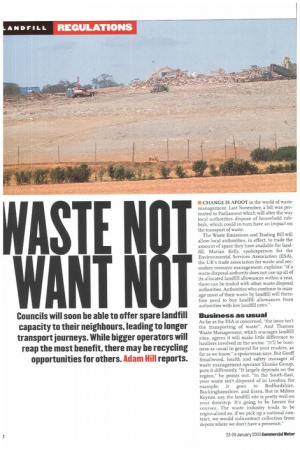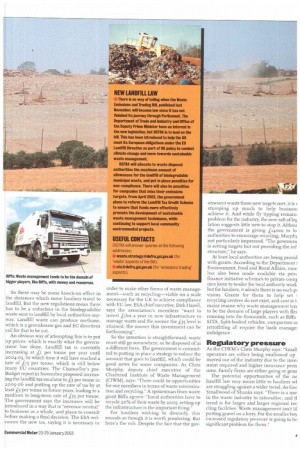NASTE VIANT
Page 42

Page 43

If you've noticed an error in this article please click here to report it so we can fix it.
Councils will soon be able to offer spare landfill capacity to their neighbours, leading to longer transport journeys. While bigger operators will reap the most benefit, there may be recycling opportunities for others. Adam Hill reports.
• CHANGE IS AFOOT in the world of waste management. Last November, a bill was presented to Parliament which will alter the way local authorities dispose of household rubbish, which could in turn have an impact on the transport of waste.
The Waste Emissions and Trading Bill will allow local authorities, in effect, to trade the amount of space they have available for landfill. Marian Kelly, spokesperson for the Environmental Services Association (ESA), the UK's trade association for waste and secondary resource management, explains: If a waste disposal authority does not use up all of its allocated landfill allowances within a year, these can be traded with other waste disposal authorities. Authorities who continue to manage most of their waste by landfill will therefore need to buy landfill allowances from authorities with low landfill rates."
Business as usual
As tar as the ESA is concerned. "the issue isn't the transporting of waste". And Thames Waste Management, which manages landfill sites, agrees it will make little difference to hauliers involved in the sector. "it'll be business as usual in general for your readers, as far as we know," a spokesman says. But Geoff Smallwood. health and safety manager of waste management operator Shanks Group, puts it differently. "It largely depends on the region," he points out. "In the South-East, your waste isn't disposed of in London, for example: it goes to Bedfordshire, Buckinghamshire, and Essex. But in Milton Keynes, say, the landfill site is pretty well on your doorstep. It's going to be horses for courses. The waste industry tends to be regionalised so, if we pick up a national contract, we would subcontract collection from depots where we don't have a presence."
So there may be some knock-on effect in the distances which some hauliers travel to landfill. But the new regulations mean there has to be a reduction in the biodegradable waste sent to landfill by local authorities anyway. Landfill waste can produce methane, which is a greenhouse gas and EC directives call for that to be cut.
An obvious way of attempting this is to put up prices, which is exactly what the government has done. Landfill tax is currently increasing at L per tonne per year until 2004-05, by which time it will have reached a rate of L's per tonne, which is still below many EU countries. The Chancellor's preBudget report in November proposed increasing the landfill tax escalator to h per tonne in 2005-06 and putting up the rate of tax by at least £3 per tonne in future years, leading to a medium to long-term rate of £35 per tonne. The government says the increases will be introduced in a way that is "revenue neutral" to business as a whole, and plans to consult before making a final decision. The ESA welcomes the new tax, saying it is necessary in
order to make other forms of waste management—such as recycling—viable on a scale necessary for the U K to achieve compliance with EU law. ESA chief executive, Dirk Hazell, says the association's members "want to invest Libn a year in new infrastructure to manage waste and the sooner the /35 level is attained, the sooner this investment can be forthcoming".
So the intention is straightforward: waste must still go somewhere, or be disposed of in a different form. The government is committed to putting in place a strategy to reduce the amount that goes to landfill, which could be good news for some companies. As Chris Murphy, deputy chief executive of the Chartered Institute of Waste Management (CIWNI), says: "There could be opportunities for our members in terms of waste minimisation and recycling." A spokesman from waste giant Biffa agrees: "Local authorities have to recycle 20% of their waste by 2005; setting up the infrastructure is the important thing."
For hauliers wishing to diversify, this sounds as though it is worth pondering. But here's the rub, Despite the fact that the gov
ernment wants these new targets met, it is stumping up much to help businesi achieve it. And while fly tipping remain: problem for the industry, the new raft of le lation suggests little new to stop it. Althou the government is giving fi4om to lo authorities to encourage recycling, Murphy not particularly impressed. "The governmt is setting targets but not providing the Mf structure," he says.
At least local authorities are being provid with grants. According to the Department i Environment, Food and Rural Affairs, mon has also been made available via privi finance initiative schemes to private corn' nies keen to tender for local authority work but for hauliers, it admits there is no such pi vision. Grants for them to help set recycling centres do not exist, and cost is t major reason why waste management ten to be the domain of large players with flet running into the thousands, such as Biffa SITA. Split-bodied vehicles, compactors ai retrofitting all require the bank manage] indulgence.
Regulatory pressure
As the CIWM's Chris Murphy says: "Small operators are either being swallowed up moved out of the industry due to the invei ment required and higher insurance pren urns. Family firms are either going or gout The potential opportunities of the ne landfill law may mean little to hauliers wl are struggling against a wider trend. As Gec Smallwood of Shanks says: "There is a mu in the waste industry to rationalise, and tl trend is for larger and larger regional rec cling facilities. Waste management isn't lii putting gravel on a lorry. For the smaller boy increased regulatory pressure is going to be significant problem for them."




























































































































































